Related Research Articles
The Carolina shag is a partner dance done primarily to beach music. Today, the shag is a recognized dance in national and international dance competitions.

Myrtle Beach is a coastal city on the east coast of the United States in Horry County, South Carolina. It is located in the center of a long and continuous 60-mile (97 km) stretch of beach known as "The Grand Strand" in northeastern South Carolina.
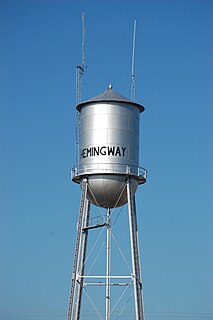
Hemingway is a town in Williamsburg County, South Carolina, United States. The population was 459 at the 2010 census.
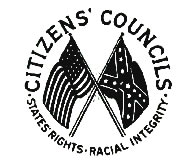
The Citizens' Councils were an associated network of white supremacist, segregationist organizations in the United States, concentrated in the South and created as part of a white backlash against the US Supreme Court's landmark Brown v. Board of Education ruling. The first was formed on July 11, 1954. The name was changed to the Citizens' Councils of America in 1956. With about 60,000 members across the Southern United States, the groups were founded primarily to oppose racial integration of public schools: the logical conclusion of the Brown v. Board of Education ruling.

The Grand Strand is an arc of beach land on the Atlantic Ocean in South Carolina, United States, extending more than 60 miles (97 km) from Little River to Winyah Bay. It is located in Horry and Georgetown Counties on the NE South Carolina coast.
Beach music, also known as Carolina beach music, and to a lesser extent, Beach pop, is a regional genre of music in the United States which developed from rock/R&B and pop music of the 1950s and 1960s. Beach music is most closely associated with the style of dance known as the shag, or the Carolina shag, which is also the official state dance of both North Carolina and South Carolina. Recordings with a 4/4 "blues shuffle" rhythmic structure and moderate-to-fast tempo are the most popular music for the shag, and the vast majority of the music in this genre fits that description.

Shag is a 1989 American comedy film starring Bridget Fonda, Phoebe Cates, Annabeth Gish, Page Hannah, Jeff Yagher and Scott Coffey. Directed by Zelda Barron, the film features Carolina shag dancing and was produced in cooperation with the South Carolina Film Commission. The soundtrack album was on Sire/Warner Bros. Records.

Broadway at the Beach is a shopping center and entertainment complex located in Myrtle Beach, South Carolina. Broadway at the Beach is owned and operated by Burroughs & Chapin. The $250 million attraction is set on 350 acres (1.4 km2) in the heart of Myrtle Beach and features three theaters, over 20 restaurants and over 100 specialty shops as well as attractions, Clubs for the night, and hotels, all surrounding the 23-acre (93,000 m2) Lake Broadway. Broadway at the Beach receives upwards of 14 million visitors annually.

The Myrtle Beach Pavilion was a historic pay-per-ride, no parking fee, 11-acre amusement park that was located in Myrtle Beach, South Carolina at the corner of 9th Avenue North and Ocean Boulevard. It was just a few blocks down from another Myrtle Beach amusement park, the Family Kingdom Amusement Park; both in the "heart" of Myrtle Beach. "The Pavilion" had well over 40 different attractions for kids and thrill-seekers alike, and included the wooden rollercoaster Hurricane: Category 5. Despite all the best efforts made by citizens to save the park, it was lost to redevelopment in 2007. While the park was officially closed and became a vacant lot on 9th Avenue and Ocean Boulevard in 2007, some of the rides and attractions were moved to Broadway at the Beach. Broadway at the Beach and the land at 9th Avenue are both owned by Burroughs & Chapin.
Harry Deal and the Galaxies is a rock and roll band formed in Taylorsville, North Carolina, United States, in 1959. They are most famous for playing a style of music known as beach music, which began in the 1940s in dance clubs of South Carolina beach towns such as Myrtle Beach.

Black Bike Week, also called Atlantic Beach Bikefest and Black Bikers Week, is an annual motorcycle rally in the Myrtle Beach, South Carolina area, held on Memorial Day weekend. Called a "one-of-a-kind event" and "an exhibitionist's paradise" by Jeffrey Gettleman, Black Bike Week is "all about riding, styling and profiling," in the words of Mayor Irene Armstrong of Atlantic Beach, South Carolina.
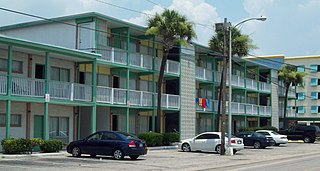
Rainbow Court was a historic hotel complex located at Myrtle Beach in Horry County, South Carolina. The complex of buildings ranged in dates of construction from 1935 to 1959. The complex included: two motel-type buildings, five beach cottages/boarding houses, and a small house. The buildings were situated around an open court with a swimming pool. There were six contributing buildings. It was one of the few remaining examples of the small-scale, low-rise motels that pre-dated Hurricane Hazel (1954).
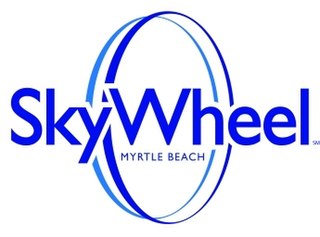
The Myrtle Beach Skywheel is a 187-foot tall (57.0 m) observation wheel located in Myrtle Beach, South Carolina, that opened May 20, 2011. At the time of its opening was the second-tallest extant Ferris wheel in North America, after the 212-foot (64.6 m) Texas Star in Dallas, and the tallest wheel in the United States east of the Mississippi River. It is now the sixth-tallest Ferris wheel in the United States.
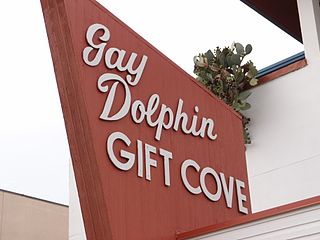
The Gay Dolphin Gift Cove is located at 916 North Ocean Boulevard in Myrtle Beach, South Carolina, United States, and calls itself "the nation's largest gift shop". As of 2011, the Gay Dolphin had 26,000 square feet (2,400 m2) and store owner Justin "Buz" Plyler said the store averaged 70,000 items. Located in 50 sections called "coves", including an Elvis Cove, items include "sea shells, brushes for bald men and noisy seat cushions." Larger items have included a fountain with three dolphins costing $7,000 and a life-size cigar store Indian. Tom Pierce's Trader Bill's Shark's Tooth Cove rents space in the building. People can bring in their own shark teeth and have them made into jewelry.
The Birmingham riot of 1963 was a civil disorder and riot in Birmingham, Alabama, that was provoked by bombings on the night of May 11, 1963. The bombings targeted African-American leaders of the Birmingham campaign, but ended in the murder of three adolescent girls. The places bombed were the parsonage of Rev. A. D. King, brother of Martin Luther King Jr., and a motel owned by A. G. Gaston, where King and others organizing the campaign had stayed. It is believed that the bombings were carried out by members of the Ku Klux Klan, in cooperation with Birmingham police. In response, local African-Americans burned businesses and fought police throughout the downtown area.

The Negro Motorist Green Book was an annual guidebook for African American roadtrippers. It was originated and published by African American New York City mailman Victor Hugo Green from 1936 to 1966, during the era of Jim Crow laws, when open and often legally prescribed discrimination against African Americans especially and other non-whites was widespread. Although pervasive racial discrimination and poverty limited black car ownership, the emerging African American middle class bought automobiles as soon as they could, but faced a variety of dangers and inconveniences along the road, from refusal of food and lodging to arbitrary arrest. In response, Green wrote his guide to services and places relatively friendly to African-Americans, eventually expanding its coverage from the New York area to much of North America, as well as founding a travel agency.

The Biloxi wade-ins were three protests that were conducted by local African Americans on the beaches of Biloxi, Mississippi between 1959 and 1963, during the civil rights movement. The demonstrations were led by Dr. Gilbert R. Mason, Sr. in an effort to desegregate the city's 26 mi (42 km) of beaches on the Mississippi Gulf Coast. This was a local effort, without involvement from the state or national NAACP.
Bo Bryan is a Southern writer, novelist, best known for nonfiction, a regional bestseller SHAG, The Legendary Dance of the South. SHAG won awards for design and content. Bryan’s novel, Bitsty Nickel Might Have AIDS, generated controversy in the early 1990s. The novel was optioned for film. Bryan abruptly departed the Southern literary scene in 1997. He is known to have produced a quantity of work since then but has published nothing in recent years.
Elizabeth Webster "Beth" Mitchell was an American educator and competitive shag dancer. In 1998 she won the National Shag Dance Championship in Myrtle Beach, South Carolina. Mitchell was killed during the 1998 Gainesville–Stoneville tornado outbreak a week after she won the championship.

The 1964 Monson Motor Lodge protest was part of a series of events during the civil rights movement in the United States which occurred on June 18, 1964, at the Monson Motor Lodge in St. Augustine, Florida. The campaign in June – July 1964 was led by Robert Hayling, Martin Luther King Jr., Ralph Abernathy, Andrew Young, Hosea Williams, C. T. Vivian, Fred Shuttlesworth, among others. St. Augustine was chosen to be the next battleground against racial segregation on account of it being both highly racist yet also relying heavily on the northern tourism dollar. Furthermore, the city was due to celebrate its 400th anniversary the following year, which would heighten the campaign's profile even more. Nightly marches to the Slave market were organized, which were regularly attacked and saw the marchers beaten.
References
- 1 2 Johnson, Chloe (August 17, 2017). "Little Richard and Ella Fitzgerald played there, now MB has new plans for the site". The Sun News . Retrieved September 11, 2017.
- 1 2 3 4 5 6 7 8 Prabhu, Maya T. (March 30, 2015). "Residents hope history of Carver Street lives on through proposed museum". The Sun News. Retrieved October 26, 2017.
- ↑ Albert, Gerard (February 25, 2021). "From school houses to Charlie's Place, they fight to preserve Myrtle Beach's Black history". The State . Retrieved February 26, 2021.
- ↑ "'Charlie's Place' wins Emmy award". South Carolina ETV . June 17, 2019. Retrieved December 20, 2020.
- 1 2 3 Morgan, Janet (October 26, 2018). "Marker unveiled at Charlie's Place in Myrtle Beach". The Myrtle Beach Herald . Retrieved February 28, 2021.
- 1 2 3 4 Albert, Gerard (February 25, 2021). "The night KKK attacked Charlie's Place, Myrtle Beach's melting pot during segregation". The State. Retrieved February 26, 2021.
- ↑ Megan, Tomasic (October 24, 2017). "Booker T. Washington residents hope for police substation in Charlie's Place renovation". The Sun News. Retrieved October 26, 2017.
- ↑ Williamson, Caroline (June 22, 2022). "New businesses get a fighting chance at Green Book historic site in Myrtle Beach". The Sun News.